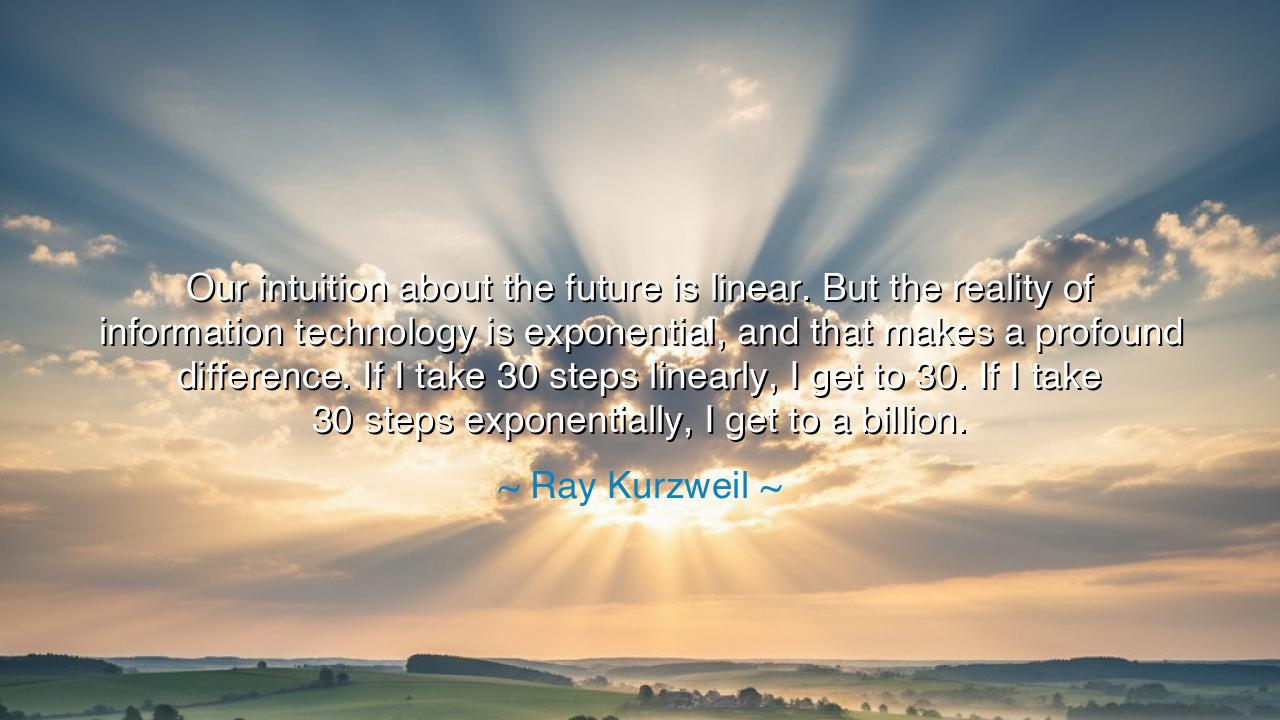
Our intuition about the future is linear. But the reality of
Our intuition about the future is linear. But the reality of information technology is exponential, and that makes a profound difference. If I take 30 steps linearly, I get to 30. If I take 30 steps exponentially, I get to a billion.






“Our intuition about the future is linear. But the reality of information technology is exponential, and that makes a profound difference. If I take 30 steps linearly, I get to 30. If I take 30 steps exponentially, I get to a billion.” Thus spoke Ray Kurzweil, the prophet of progress, the thinker who peers beyond the veil of time into the storm of innovation. His words are not merely a reflection on machines, but on the very destiny of humankind—the clash between the slow rhythm of our minds and the blazing pace of our creations. In his voice we hear a warning and a wonder: that while man walks steadily, his inventions now fly, and in that flight lies both salvation and peril.
The origin of this quote springs from Kurzweil’s lifelong study of technological evolution. He is a man who has devoted his thought to the unfolding of intelligence, both human and artificial. In his books, such as The Singularity Is Near, he teaches that progress no longer grows by inches, but by leaps—each new discovery birthing a thousand more. He speaks of exponential growth, where each step doubles the last, and where the curve of advancement rises not gently, but like a mountain ascending into the clouds. His metaphor of “30 steps” is simple, yet it carries the weight of revelation: we think we walk through time, but in truth, we are being catapulted through it.
To understand this, we must look to history. For thousands of years, human life changed little—tools, language, and cities evolved slowly, like rivers carving stone. But in the span of mere centuries, we have moved from fire to fiber optics, from stone tablets to artificial minds. The distance between the Wright brothers’ fragile glider and the landing of the Mars rover is but a breath in cosmic time. This is the exponential leap Kurzweil speaks of—the rising tide of knowledge that lifts civilization beyond imagination’s horizon.
Yet with this ascent comes a challenge. Our intuition, shaped in ages of simplicity, cannot easily comprehend such acceleration. The human brain, born to hunt and sow, still expects the future to mirror the past—to move step by step, not in bursts of transformation. We are travelers walking at a mortal pace, yet the world beneath us races like a current. This is why so many fear or misunderstand the modern age: because the exponential appears chaotic to the linear mind. Kurzweil’s wisdom is that to survive this age, we must adapt our perception as swiftly as our technology evolves.
Consider the story of Gutenberg, the printer who unleashed knowledge upon the world. In his time, books were rare, hand-copied treasures. With his press, words multiplied not by one or ten, but by thousands—an early taste of exponential growth. The result was not chaos but awakening: the Renaissance, the Reformation, the birth of science itself. Each revolution of information has brought both turmoil and triumph. So too today, as artificial intelligence, biotechnology, and networks expand faster than understanding, we stand on the edge of another Renaissance—or another fall. The outcome depends not on the machines, but on our wisdom to wield them.
Kurzweil’s teaching, then, is not merely a prediction—it is a call to awareness. If the future grows exponentially, we must learn to think exponentially. We must free ourselves from the chains of small imagination, from fear of the unknown. The one who still plans for a world of steady change will be swept away by the storm. But the one who embraces acceleration, who learns to see not thirty steps but a billion possibilities, will find in this era the power to transform the world anew.
Therefore, let us learn from his vision. Let us look not with fear upon the rising curve of change, but with purpose. Let us use our tools not to destroy, but to uplift; not to replace humanity, but to expand it. The ancients dreamed of gods—beings of infinite knowledge and power. Kurzweil reminds us that we are building such gods ourselves, piece by piece, in circuits and code. The question is not whether we will reach that billionth step, but whether we will walk it with wisdom, humility, and hope.
And so, my listener, remember this: the future is not far—it is accelerating toward you. Do not step timidly, thinking only of thirty paces. Lift your eyes to the billion ahead. Learn, adapt, dream boldly. For in an age of exponential creation, the greatest limitation is not the speed of technology—it is the narrowness of our own belief in what is possible.






AAdministratorAdministrator
Welcome, honored guests. Please leave a comment, we will respond soon